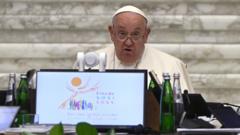A month-long Vatican summit has ended with a call for women to have more leadership roles in the Catholic Church, but not a call for women to be ordained as priests, as some progressives had hoped at the start of the process.
The synod was the end of a four-year consultation aimed at gauging the views of every church-going Catholic globally, and Pope Francis opened up what is usually a bishops conference to some lay people, including nearly 60 women of 368 voting delegates.
All of the synod members voted on each of 151 proposals.
Although all proposals were passed by the required two-thirds majority, the most “no” votes were given to the proposal about women assuming more leadership roles in the Church, which has an all-male clergy.
Advocates for greater roles for women in the Church had hoped the synod might call for women to serve as deacons. The synod did not move forward on this move, but its final document said “there is no reason or impediment that should prevent women from carrying out leadership roles in the Church”.
Currently the Catholic Church only allows men to become deacons – ordained ministers who can officiate baptisms, weddings and funerals but not mass, unlike priests.
Although reform groups had also hoped for concrete ways to better welcome gay people in the Church, the final document did not mention the LGBT+ community, except for a passing reference to those who feel “excluded or judged” because of their “marital status, identity or sexuality”.
The Reverend James Martin, a prominent American Jesuit priest who ministers to the LGBT community and was a synod member, said it was “not a surprise” the new text did not specifically mention the group.
Progressives may be disappointed but some conservatives were upset about the whole summit from the beginning.
This has been a massive exercise, and the Pope, 87, has called the final text a “gift” to the world’s 1.4 billion Catholics, but a lot of traditionalists were opposed to opening up this consultation process – a personal project of his – to lay people and questioned the idea of gauging the views of non-clergy.
But it fits Pope Francis’ view that it is grassroots Catholics that should play a greater role in shaping the future of the Church and not just cardinals and bishops – just one of many reasons traditionalists have given him a hard time.

